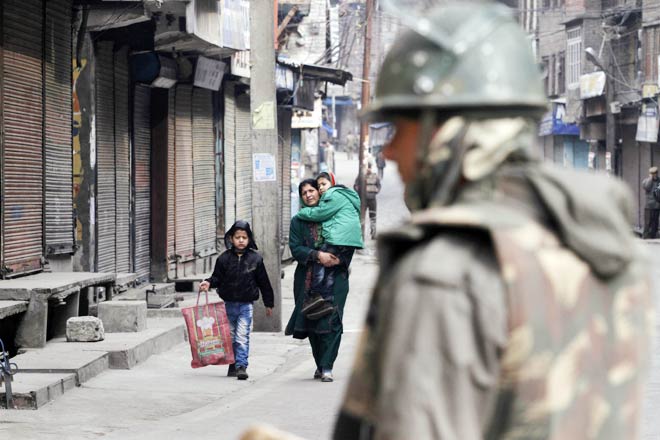"We have our own investigating agency. A time-bound inquiry is on. If there was any lapse, let me assure you in the true tradition of the army that the truth will prevail, justice will prevail. That is the word of honour," the Baramulla divisional commander, Major General V.G. Khandarey, told reporters here.
He was speaking after a meeting Wednesday with Medical Education Minister Taj Mohiuddin, Minister of State for Home Sajad Kitchloo, Divisional Commissioner (Kashmir) Asgar Hassan Samoon and the district magistrate of Baramulla in connection with the incident.
"Firstly, let me tell you that the relation between the 'awam' (people) and the army in Baramulla dates back to 1947. It is the oldest relationship between two brothers. The men in uniform and the men in civvies are two brothers. When we say people have been shot, I can understand. We definitely condole the death of the young boy," Khandarey said.
Terming the incident as "unfortunate and regrettable", Mohiuddin said: "The army has assured us of a time-bound inquiry. An FIR (First Information Report) has also been lodged. Those involved would be brought to justice."
Following the death of the youth Tuesday, curfew continued in Baramulla town, the adjacent town of Sopore, five police station areas in summer capital Srinagar and south Kashmir's Kulgam and Pulwama towns Wednesday.
Incidents of stone pelting on the security forces by angry mobs have taken place at about a dozen places in the Kashmir Valley since the youth's death.
The police and Central Reserve Police Force (CRPF) are handling the situation with maximum restraint.

Earlier:
Kashmir on the boil again; curfew imposed
Srinagar, Mar 6: Authorities imposed curfew in many areas across the Kashmir valley on Wednesday following the brutal killing of a youth on Tuesday in the northern town of Baramulla by security forces.
"Curfew has been imposed in Rainawari, Nowhatta, SR.Gunj, Safa Kadal, Maisuma, Kralkhud and Zadibal police stations areas of Srinagar city today. Curfew has also been imposed in Baramulla, Sopore, Pulwama and Kulgam towns", a senior police officer said here.
Reports from other major towns of the valley indicate police and central reserve police force (CRPF) have been deployed in strength to maintain law and order.
Tahir Lateef Sofi, 24, was killed in a firing incident at Chati Padshahi Bridge in north Kashmir's Baramulla town, allegedly by the Army, during protests on Tuesday evening.
Residents of the area said a group of locals started the protest gathering in Kakar Hammam area of the town after homes were ransacked and parked vehicles smashed, allegedly by security forces, and there was firing in the air from security personnel to quell the protest.
Thousands of people later gathered in the town and attacked the office of the district magistrate demanding action against those involved in the killing of the youth.
The district magistrate has ordered a magisterial enquiry into the firing incident. Baramulla police have also registered an FIR against those security personnel responsible for the firing.
State chief minister Omar Abdullah has again reiterated his demand for the partial revocation of the Armed Forces Special Powers Act (AFSPA) that gives blanket immunity to the Army and the paramilitary forces deployed to fight militancy in areas declared "disturbed" under the act.
The chief minister broke down in the state legislative assembly on Tuesday when the opposition People's Democratic Party (PDP) staged a walkout over the Baramulla youth's killing. Omar Abdhullah promised that those responsible for the killing would be brought to justice.
The chief minister later dispelled rumours that he had decided to resign over the issue. Omar Abdullah said on his micro blogging Twitter site if stepping down as chief minister could bring a man back to life, he would resign in a flash.
The Army, meanwhile, has denied that its men were involved in the killing of the Baramulla youth.
An Army spokesman said: "An aggressive mob of over 250 people attacked a foot patrol of the Army in the town yesterday. Despite repeated warnings and caution, the mob surrounded the patrol and people from within the crowd started attacking Army personnel.
"The patrol was soon outnumbered, leaving some of them injured. A person out of the mob assaulted the Army personnel with an iron rod creating a life threatening situation. To extricate themselves, the patrol fired, aiming in the air, which could not have resulted in any injury as the place of the incident where the person died was well away from the location of the patrol, and could have in no way been affected by the firing by the patrol in the air".
The spokesman added that there were intelligence inputs with regard to the plans by militants to entangle Army personnel, particularly in Baramulla, in a protest, and to attack the Army taking shield of the crowd, with a view to trigger large-scale violence.
"The Army has ordered an investigation to get to the bottom of the truth", the spokesman said.





Comments
Add new comment